photos by Logan Wallace and others
Builders breathe life into a blueprint. They are diversely skilled individuals, unified in purpose, who move a vision from idea to plan, then construct its reality.
Virginia Tech’s bold plan to be a force for positive change throughout the world builds on the university’s time-honored tradition of service and its living motto, Ut Prosim, (That I May Serve). It’s a blueprint contingent on people builders committed to bringing their unique expertise to the table, expanding their focus to all fields, and jointly answering the call to serve.
Virginia Tech is renowned for its roll-up-your-sleeves brand of hard work, resilient commitment, and can-do attitude. True to the blue-collar heritage of Southwest Virginia, these distinguishing characteristics set Hokies apart. For Virginia Tech football players, this distinctive brand of moxie is uniquely symbolized by the famed lunch pail, reminding all Hokies from the research lab or the boardroom to the athletic field to focus on the WIN (what’s important now.)
More than 13,000 employees, more than 34,000 enrolled students, and nearly 250,000 living alumni comprise the Hokie Nation. And that doesn’t include the numerous friends, former faculty and staff, or family members who are Hokies at heart. Regardless of their affiliation, most are eager to continue the Tech legacy of hard work and service, transforming the role of higher education and making a positive difference in the world.
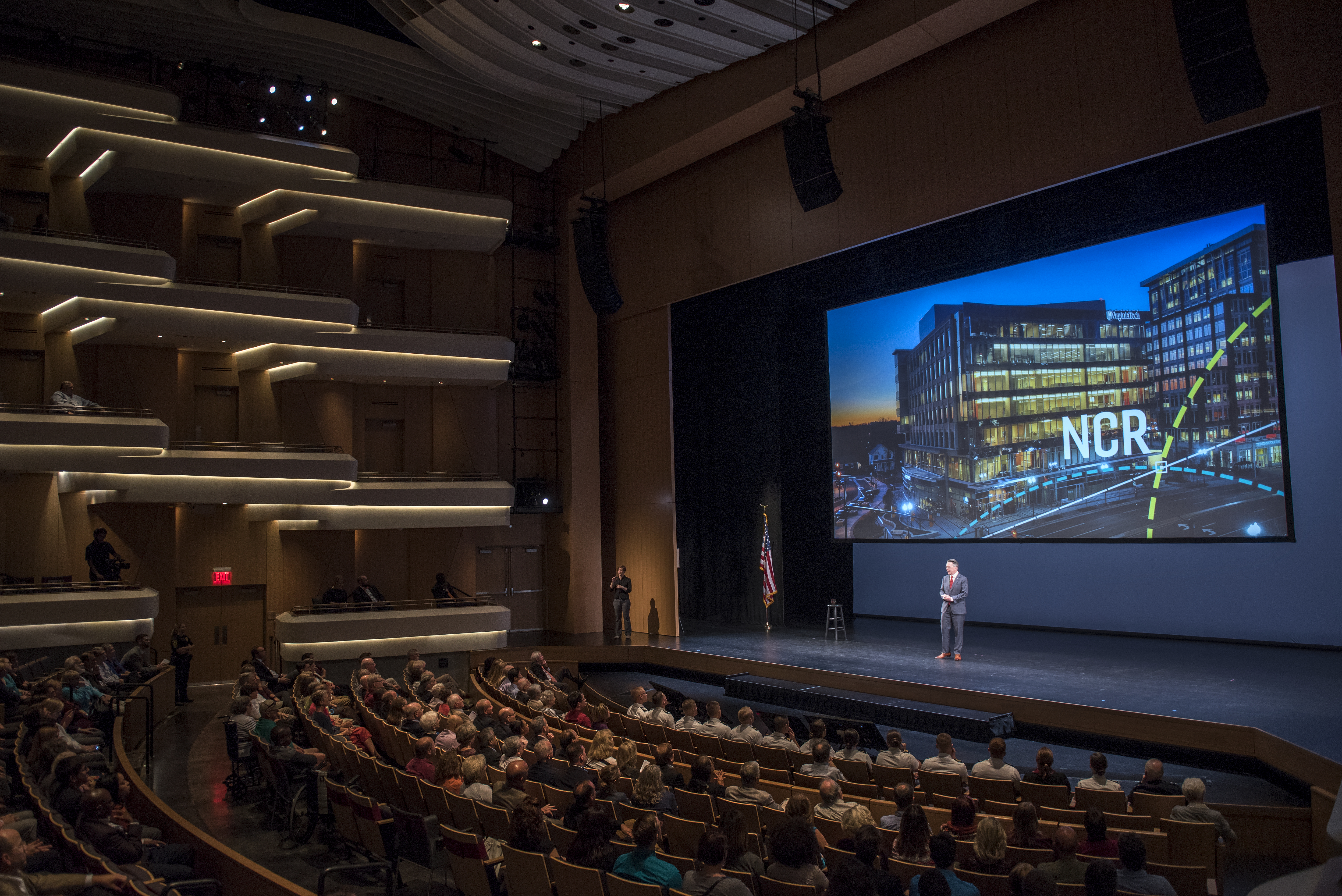
Well connected: Technology linked audiences in Blacksburg, Roanoke, and the National Capital Region for President Sands’ 2017 State of the University Address.
President Tim Sands has urged campus thought-leaders, faculty, staff, and friends to reimagine the role of a land-grant university. In 2015, he introduced the visioning process now known as Beyond Boundaries. The concept, which you can read more about at president.vt.edu, tears down the past constraints associated with higher education to establish a new standard for how universities impact the world.
Cyril Clarke, interim executive vice president and provost, is helping to guide the efforts. “There are a number of very exciting and important initiatives being advanced at Virginia Tech, and we have an opportunity to develop them into significant areas of distinction,” said Clarke.
Three pillars anchor Virginia Tech’s vision research, culture, and learning. Across the Blacksburg campus and beyond, the people who exemplify these pillars are shaping the future. Here’s a glimpse at how a few of them are helping build the 21st-century land-grant by reaching across disciplines and around the world.
A foundation for tackling real problems
At Virginia Tech, research has the power to turn a dedicated scientist into an extraordinary superhero.
Such was the case for John Jelesko, associate professor of plant pathology, physiology, and weed science, whose work studying poison ivy served as the inspiration for an evil weed-fighting character in the online comic, Partners 5. Although Jelesko never dons a literal cape and can’t leap tall buildings, he does work to make the world a little safer and a lot less itchy.
In the only research facility in the world dedicated entirely to the study of poison ivy, Jalesko is getting to know the plant on an intensely personal level investigating where it lives and what environmental factors allow it to thrive.
Teaming up with fellow researchers whose expertise was vastly different from his own greatly accelerated his work combatting the evil weed. “When you work with others who are trained in another discipline, together you can work in a way that is much larger than you alone,” Jelesko said.
Today, a smartphone app known as Investigating Toxicodenderon Change and Habitat for Years (ITCHY), which was created from these collaborations, allows for crowdsourcing of hundreds of locations of poison ivy, replacing the need for duplicated field research. Analyzing this data is also expedited thanks to partnerships with university statisticians.
Such collaboration strengthens the project, but, according to Jelesko, it also benefits the researcher.
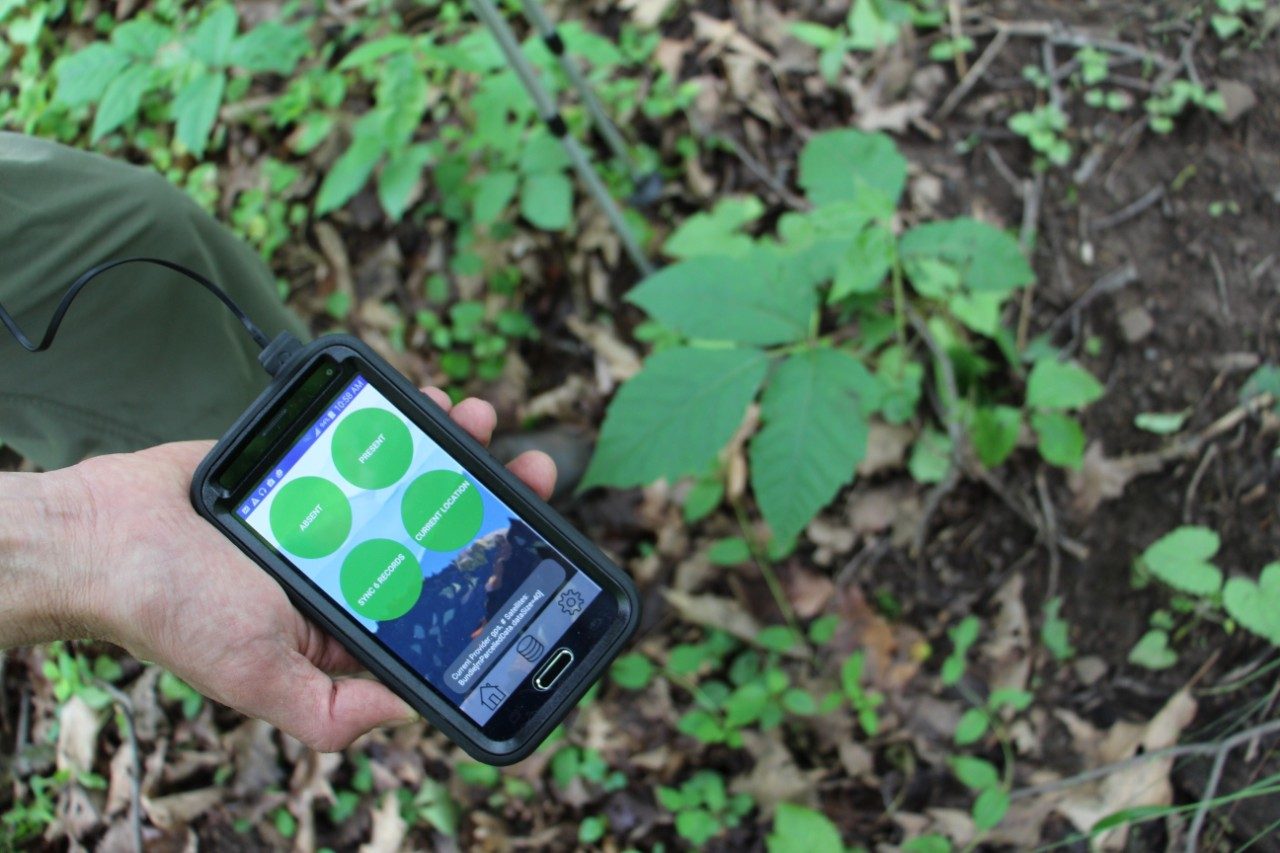
Dialed up: A smartphone app allows John Jelesko to crowdsource data from numerous locations to aid his poison ivy research. (Below) Albert Pan, associate professor, studies tiny zebrafish.
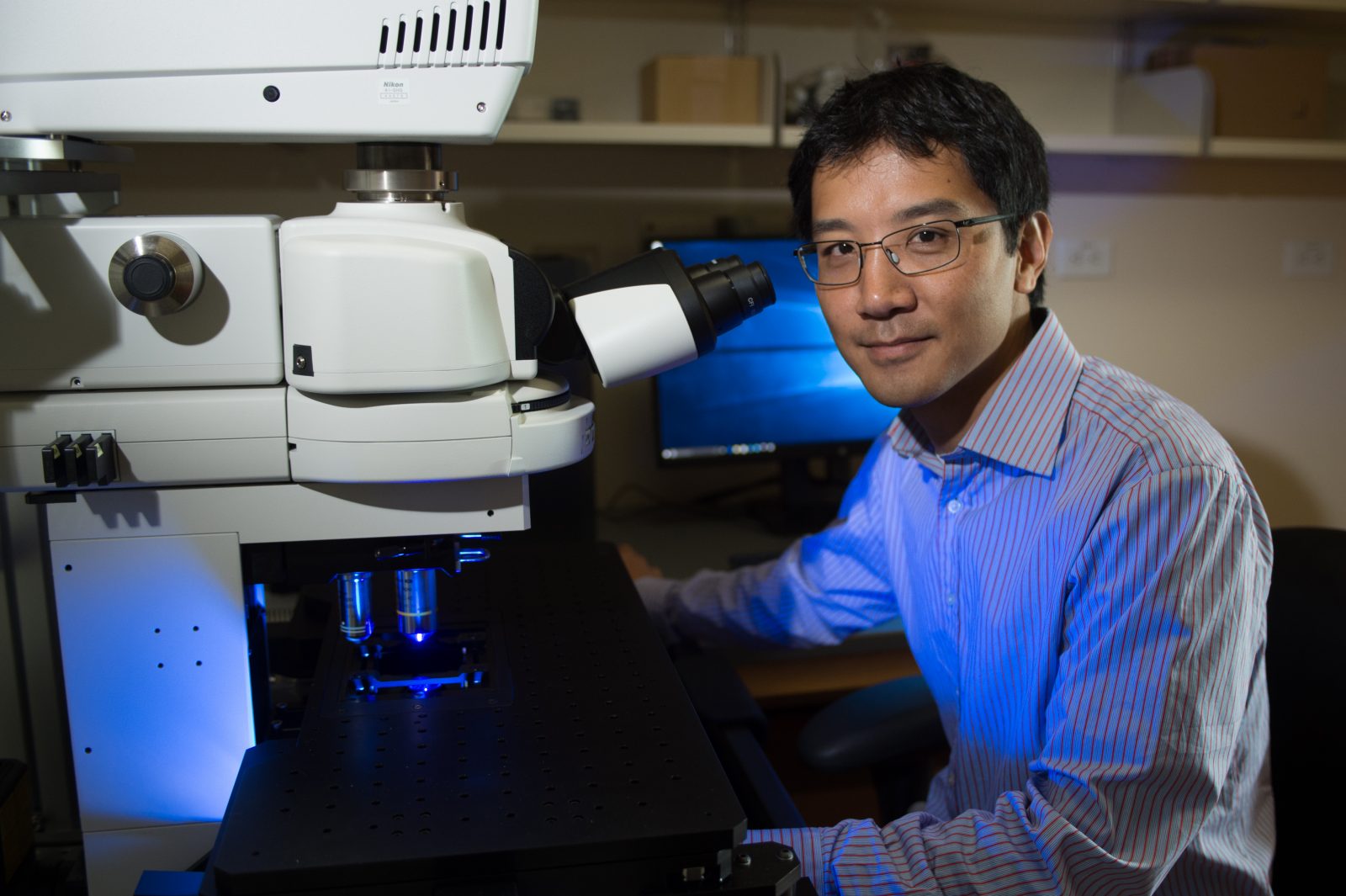
“It allows you to perhaps think of new ideas that you wouldn’t have if you just stayed stuck in your discipline,” he said. “For example, when I work with ecologists, I actually start thinking and learning about ecology more than I would from my traditional discipline. So, it greatly expands both my intellectual understanding and my curiosity.”
The opportunity to create such partnerships first lured Albert Pan to Virginia Tech last summer. A series of open doors convinced him that he made the right move.
“I was really impressed to hear about the many collaborations across departments and disciplines,” said Pan, who is now an associate professor and Commonwealth Center for Innovative Technology Eminent Research Scholar in the Development and Translational Neurobiology Center at the Virginia Tech Carilion Research Institute in Roanoke, Virginia.
Pan’s first encounters with Hokies made it evident this university was the type of friendly, open culture in which he would thrive. “Apparently, opening the door for others at Tech is a big thing,” Pan said.
It’s in this environment Pan intends to make a big splash by studying a tiny subject zebrafish brains.
Smaller than most pinky fingers, the translucent zebrafish offers researchers a perfect view of the developing brain, producing insights that can be used to learn more about the development of psychiatric disorders in humans.
While these discoveries help us understand more about how things work and may enable us to develop solutions for problems, Pan believes the value of research extends far beyond results in a lab.
“Research is a great way to communicate with the local and global community and be a part of a worldwide network in science or technology.”
Albert Pan, associate professor
“Research is a great way to communicate with the local and global community and be a part of a worldwide network in science or technology,” Pan said. In fact, his zebrafish found a role as scientific ambassadors when the lab took part in a science, technology, engineering, art, and mathematics event for about 800 elementary school children.
Pan suggested that research is also the perfect training ground for our brains. “How do we adapt to a world where information and technology are advancing exponentially? Rigorous research experience helps us become active learners, problem-solvers, and more adept at adopting technology.”
That passion for recognizing the untapped potential of the research process is echoed by Ralph Buehler, associate professor of urban affairs and planning in the National Capital Region.

Staging research: (Above) Ralph Buehler’s transportation research includes a partnership with Washington, D.C.-based Capital Bikeshare. (Below) Virginia Tech’s Center for Communicating Science encourages creative strategies for sharing information so that it can be understood across broad audiences.
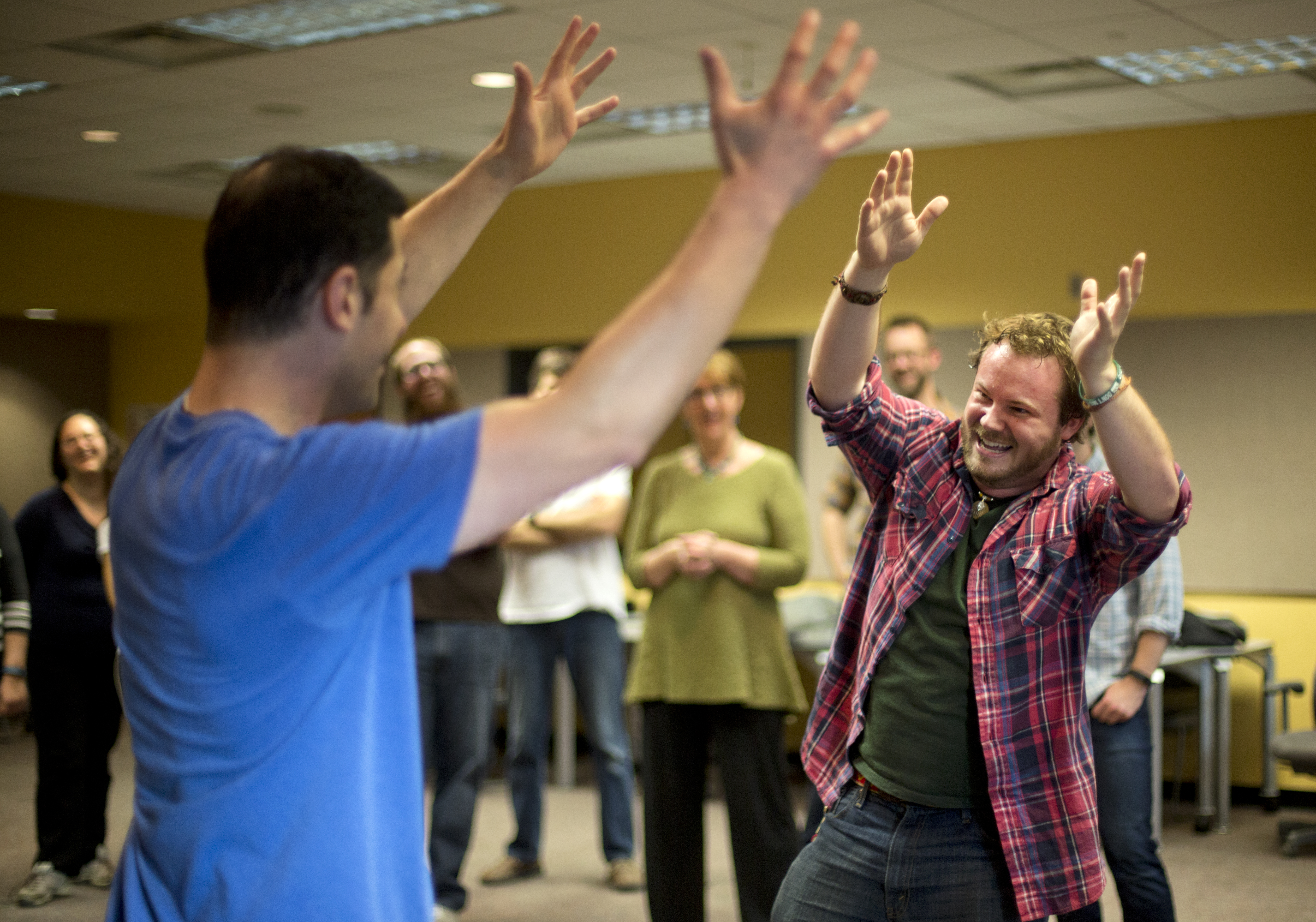
“In many ways, research is the main engine that powers the university, because knowledge gained through research contributes to teaching and educating graduates with cutting-edge abilities, motivation, and knowledge,” Buehler said.
For Buehler, research also literally fuels the ease with which people get around town. His work encompasses government transportation policy as well as the impact of transportation access on a person’s health.
“Movement for daily travel is key to public health. As one health researcher recently said at a conference, 'Sitting is the new smoking,’” Buehler said.
Buehler routinely provides his students the opportunity to explore these topics via studio classes designed to solve real-world problems for actual clients. Four such classes have targeted bicycling—three working in tandem with the Washington, D.C.-based Capital Bikeshare.
Buehler suggests that to effectively answer the really big questions, it is essential to consider issues from varying perspectives.
“Transport is mostly just a means to an end participating in an activity that cannot be reached online or is not at the place where the individual is. However, transport demand is also shaped by other trends in society and at the same time, is closely linked to quality of life, traffic safety, local and global pollution, residential segregation, et cetera.,” Buehler said. “Thus, it is crucial to look beyond the narrow disciplinary silo of transport planning.”
Shoring connections
Finding a connection between tree-killing beetles from Asia and the 1979 film “Alien” earned one Virginia Tech graduate student $500 during the university’s first Nutshell Games.
During the event, participants were charged with condensing descriptions of their research into captivating 90-second talks. Held to celebrate the opening of the Center for Communicating Science, the Nutshell Games illustrated the power of moving beyond a translation of jargon toward more effective communication.
For Patty Raun, who stepped away from her role leading the School of Performing Arts to serve as the center’s founding director, scientific communication is a stage where researchers can overcome the barriers that limit understanding and stymie potential.
“I have taken my fire for the transformational power of theater into new and unexpected places,” Raun said. “I am teaching people of all backgrounds and all interests a capacity for learning through experience ;applying theory to real-life circumstances' and building skills of empathy, connection, and communication.”
The center offers events and workshops aimed at building those skills within areas of academia where they have not traditionally been emphasized or cultivated. “We want to help specialists discover the excitement and adventure of transcending disciplinary boundaries and the satisfaction of climbing over those walls,” Raun said.
With so much of Virginia Tech’s research focused on solving the world’s most pressing issues, communication is especially important. A solution is good only if it can be understood.
“Right now, technology is far outpacing guidelines and policy. This is an urgent opportunity for the humanities to take leadership.”
Slyvester Johnson, professor
But, what happens when scientific advances collide with societal mores? What does it mean to be human in the age of smart houses, smart cars, and intelligent machines?
Sylvester Johnson, who will direct Virginia Tech’s developing Center for the Humanities, said such discussions, as well as current debates addressing social equity and disparity on a global scale, are at the heart of much of the new center’s work.
“Right now, technology is far outpacing guidelines and policy. This is an urgent opportunity for the humanities to take leadership,” Johnson said. “I envision a new humanities center at Virginia Tech that draws on the university’s unique strengths in technology by organizing an artificial intelligence ethics group that can lead the state and this region in creating inclusive, shared governance of the technology that will soon produce technologically enhanced humans and more powerful intelligent machine applications.”
Johnson believes that a university-wide collaborative effort will yield the best and most expedited results and plans to create an advisory group made up of faculty from within every college and department at Virginia Tech.
“I want the humanities center to foster a culture of humanities leadership through transdisciplinary boldness,” Johnson said. “We can build the teams we need to create a better world for experiencing our humanity without being limited or constrained by the field in which we earned a degree or by our departmental affiliation.”
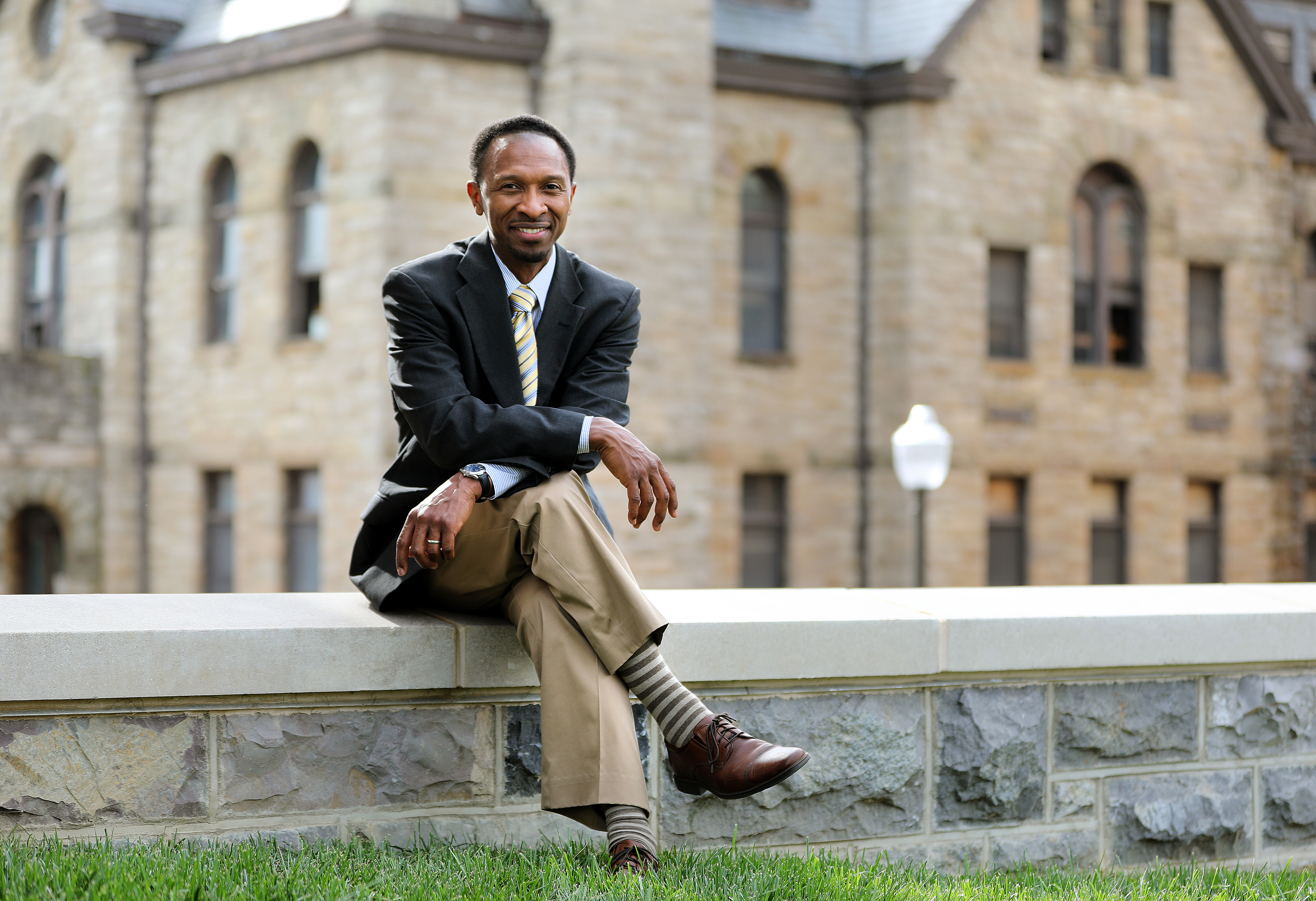
The human connection: Sylvester Johnson will direct the Center for Humanities. (Below) Students enjoy the sense of community in the Black Cultural Center.
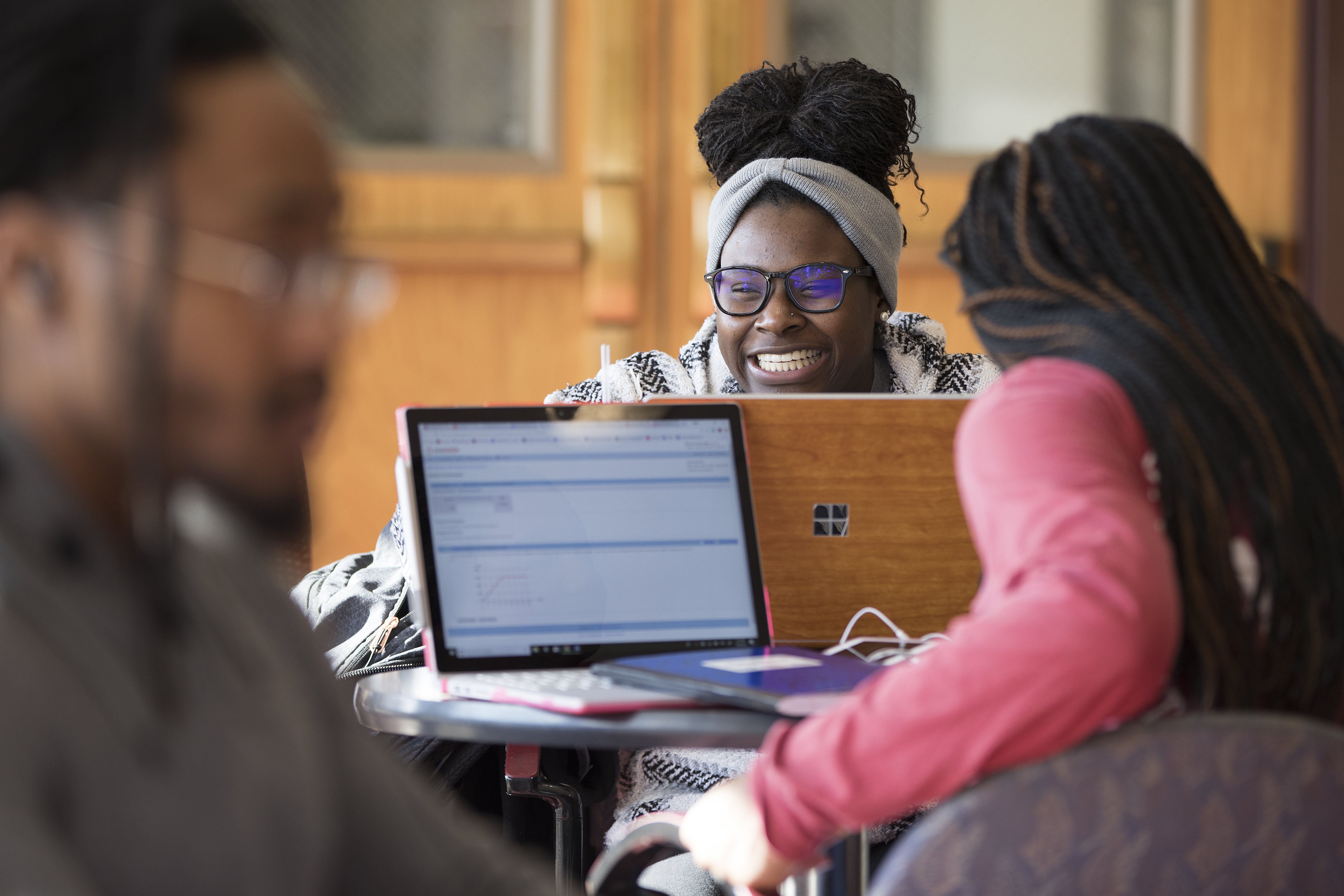
A well-rounded approach to problem-solving requires a table big enough to include a population of thinkers as diverse as our world. But an invitation to sit is not enough; those invited must also feel ownership.
Yolanda Avent knows what it takes for a student to feel genuinely connected to the university. A 1998 graduate, Avent felt alienated as a black woman during her freshman year and considered transferring—until she discovered the Black Cultural Center.
“It was a big part of my ability to survive and thrive here,” Avent said.
In October, Avent was named the senior director of the Culture and Community Centers.
In recent years, under the guidance of Student Affairs, the number of centers has expanded to six, including the Black Cultural Center, Asian Cultural Engagement Center, American Indian and Indigenous Community Center, El Centro (a Hispanic and Latino center), the LGBTQ+ Resource Center, and the Intercultural Engagement Center.
Each center consists of a room or several rooms equipped with televisions, sofas, chairs, tables, and bookshelves. But they are more than locations to study or hang out, they are hubs that reflect cultural affirmation, educational connections and community building.
“We are preparing students to become more socially conscious and to critically think about how education and technology can assist in alleviating some of the social ills that currently exist for marginalized populations,” Avent said. “Oftentimes, that starts with helping students simply see themselves as community members who belong here and not as imposters.”
While the centers represent recent advancements at Virginia Tech, the spirit of community behind them is not new. Nowhere is the link between the past, present, and future more evident than in the university’s Corps of Cadets.
“Today’s corps is far more than just a quaint reminder of the past, but actually lives and personifies the goals of Beyond Boundaries, the spirit of service that is embodied in the university’s motto, Ut Prosim (That I May Serve), and the mission of a land-grant institution,” said corps commandant Maj. Gen. Randal D. Fullhart.
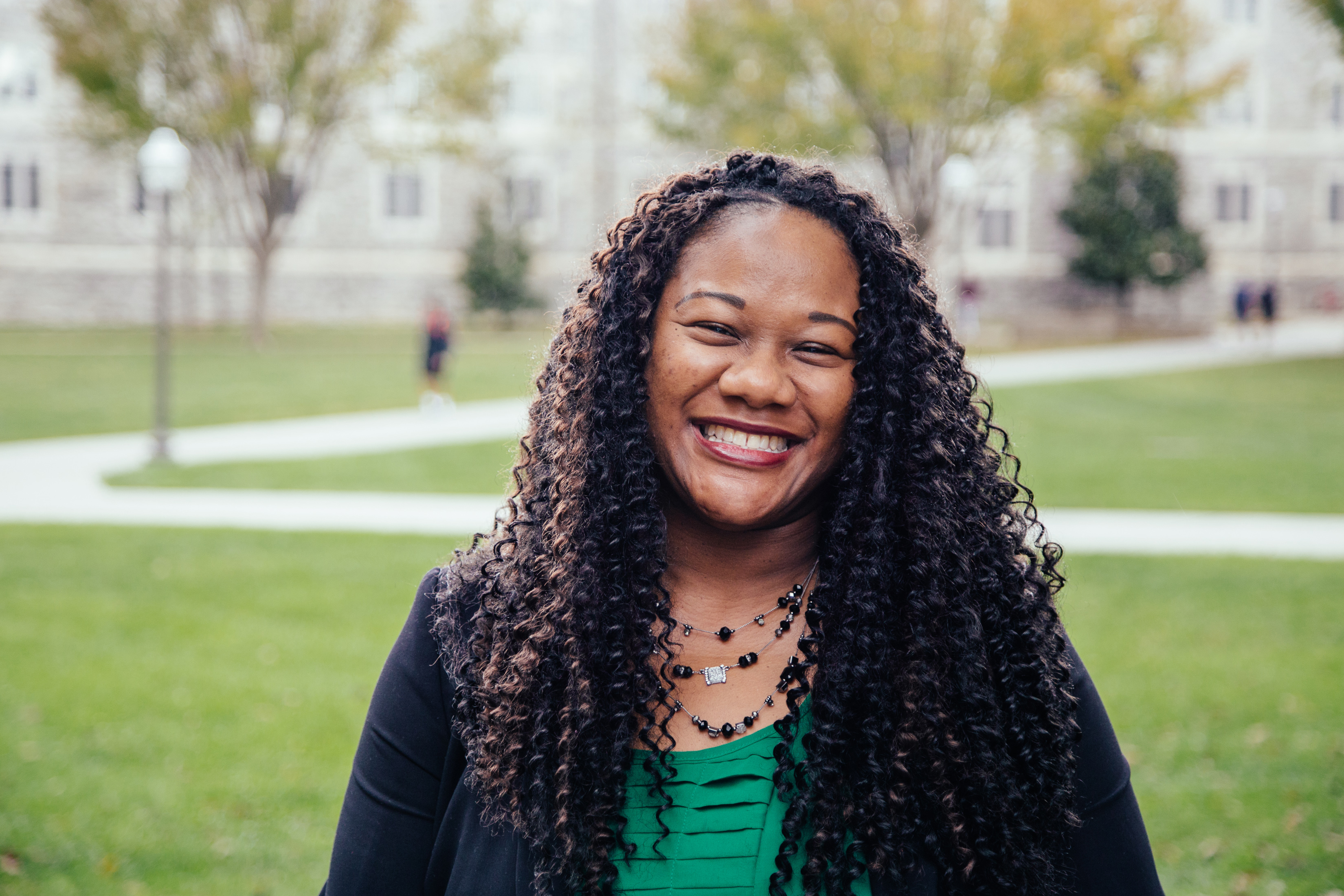
Past, present, and future: (Above) Yolanda Avent ’98 is the first director of the Cultural and Community Centers at Virginia Tech. (Below) Maj. Gen. Randal D. Fullhart leads the Virginia Tech Corps of Cadets.
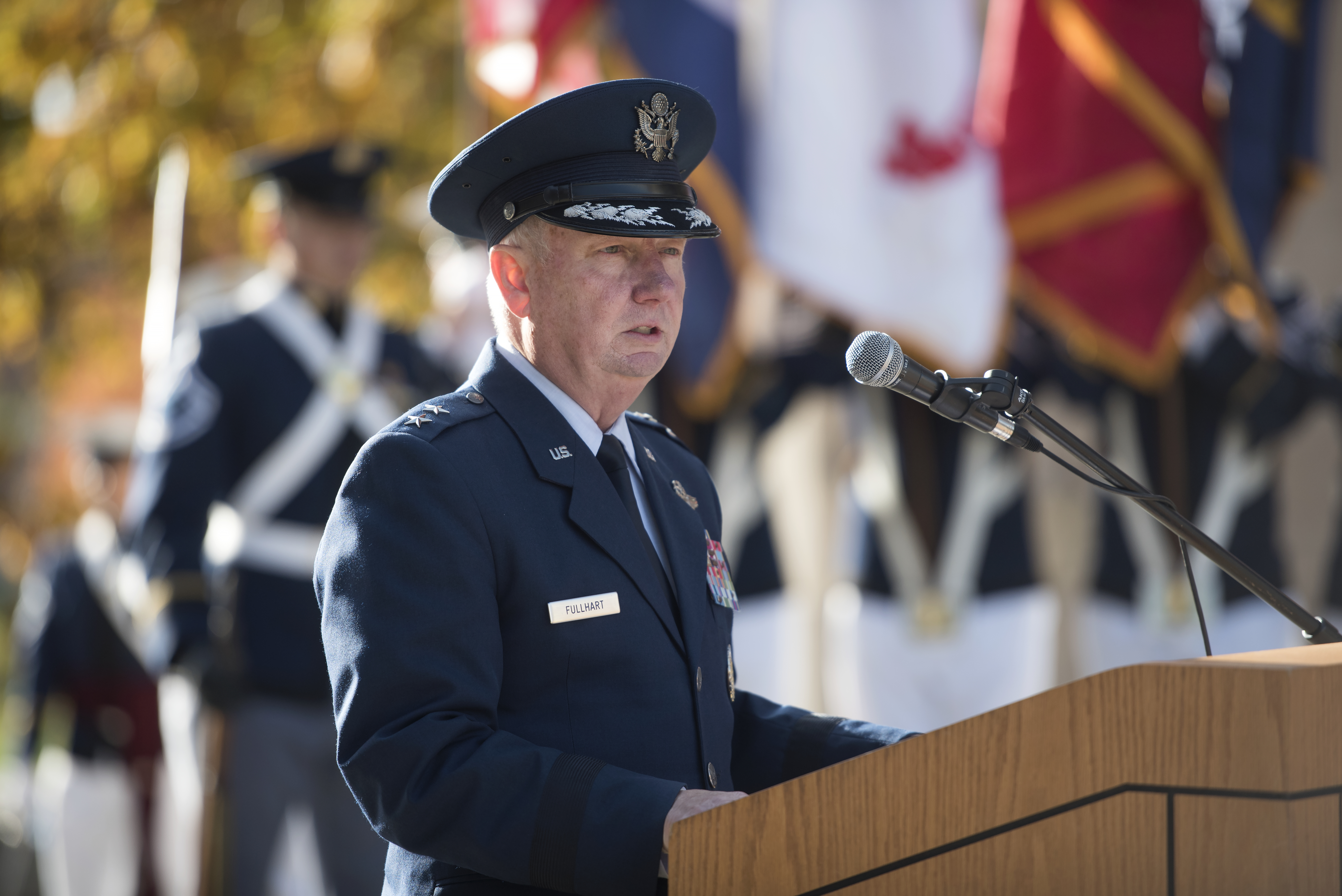
The spirit of service that leads cadets to give up some of the creature comforts their fellow students enjoy, such as sleeping late or living off campus, affords them a uniquely intense and diversified learning experience.
Annually, some cadets travel all over the world, including to places like Central America where they work with indigenous people, assist with service projects, and meet with ambassadors and embassy staff. Support from donors also allows for a select number who complete a semester-long special studies course to travel to France. They continue their classes about the leadership lessons of D-Day on the Normandy Beach before visiting Paris, where they meet with embassy officials.
The rigors and experiences of the corps are welcomed by cadets, the majority of whom intend to pursue a life of military service. Those who choose the Citizen-Leader Track and not commission, value the discipline and leadership skills they gain. As a result, they are highly sought after by public and private organizations.
“When it comes to Beyond Boundaries, that’s where our cadets already are and will be leading. They will do so as long as there is a well-supported corps that continues to live out the precepts and be a symbol of what Ut Prosim is all about,” Fullhart said.
A transformative renovation
Richard Blythe traveled to Blacksburg from the Land Down Under with the aim of turning student learning at Virginia Tech upside down.
Since the award-winning architect and educator took over as dean of the College of Architecture and Urban Studies in October 2017, he’s been working to advance the college by infusing student learning with big projects that solve real-world problems.
“We want to use the college as a change agent for societal, economic, and environmental good,” he said. “That starts with project-based partnerships to tackle the most pressing issues of our time: climate change, overpopulation, economic and social inequality, and political instability, for example.”
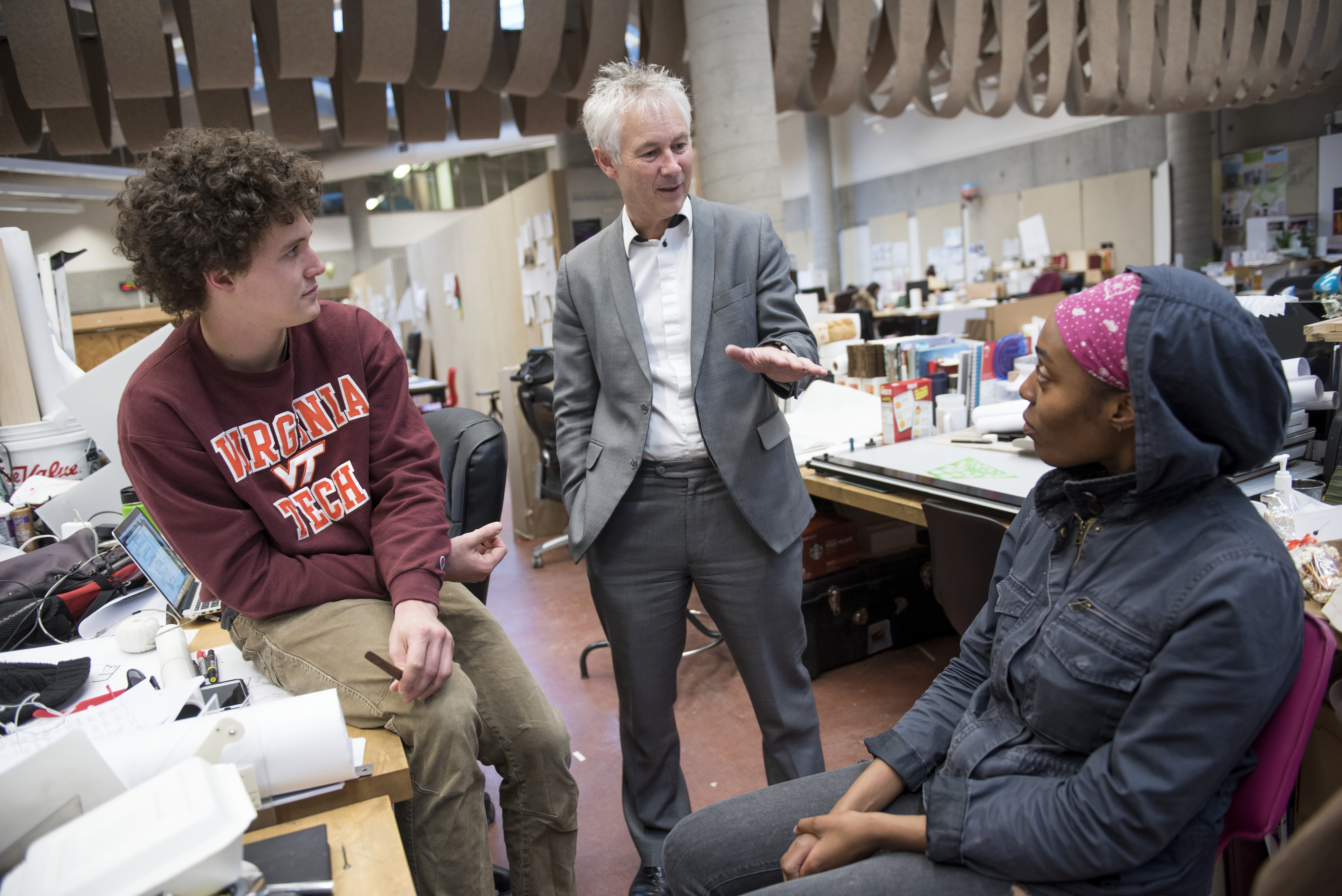
Leading the way: (Above) Richard Blythe, dean of the College of Architecture and Urban Studies, is committed to opportunities that teach through experience. (Below) Julia Ross, the first female dean of the College of Engineering, understands the importance of different perspectives.
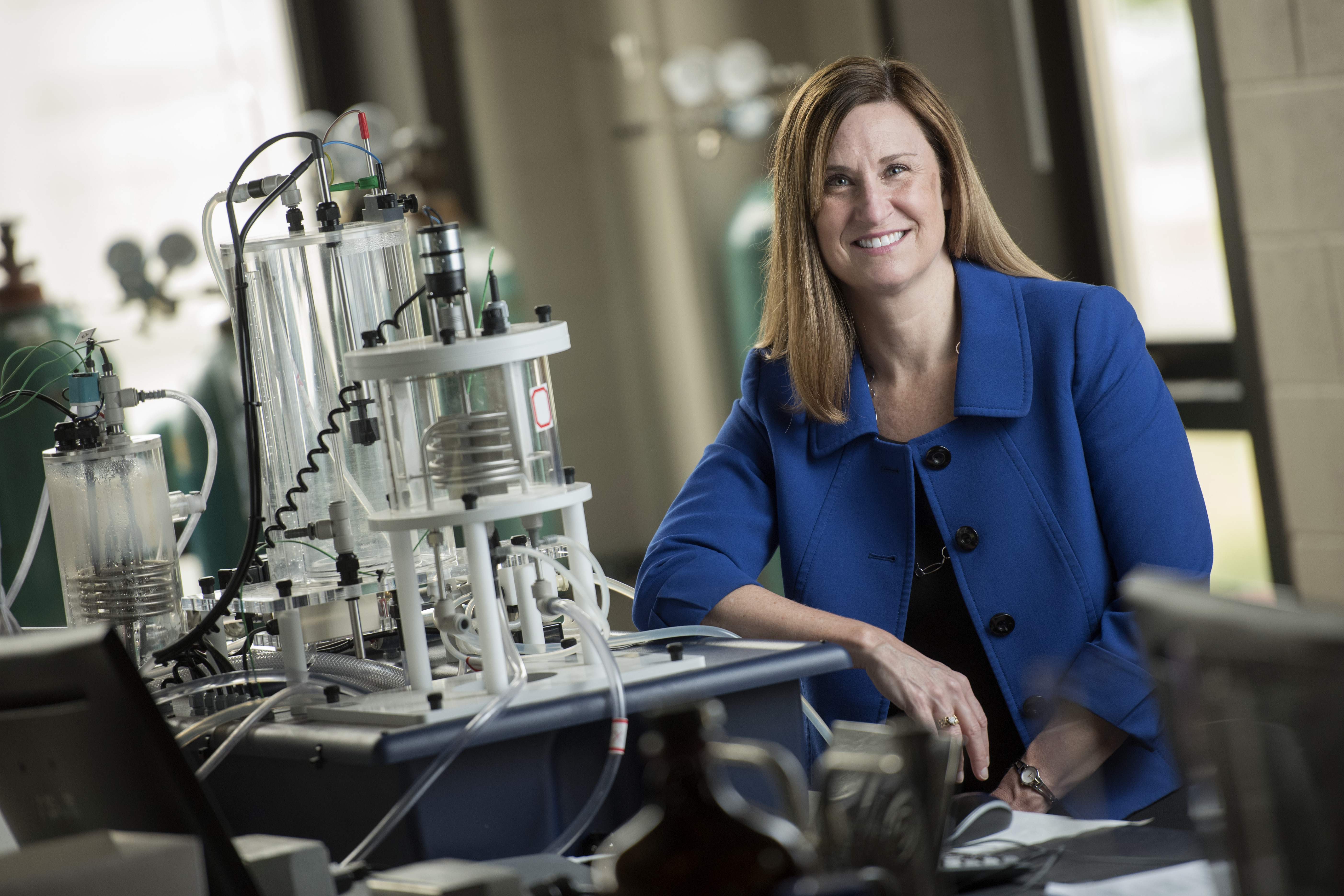
Freshmen would sign up for a project, rather than adhering to a traditional discipline or curriculum, and stick with it through graduation. Along the way, they would rotate through roles and responsibilities, work alongside leading international industry partners and experts, and cultivate the experience needed to move directly into the workforce.
“Instead of going through different subjects, you’ll perform different roles on the project,” he said. He believes this structure would allow students to understand the types of workplace relationships necessary to cultivate achievements.
Blythe is also developing a new practice-based stream in the Ph.D. program that is unlike others in the nation. It will be rooted in the Washington-Alexandria Architecture Center. “It situates knowledge and knowledge production outside of the university,” he said. “The real question now isn’t so much 'What is the fact,’ it’s 'What are you going to do with the fact.’”
Shifting away from the norm is the norm for Julia M. Ross, who joined the university in July 2017. The first female dean of the College of Engineering, Ross feels that challenging some of the restrictive traditions in higher education is the key to growing the best 21st-century problem-solvers.
“We need every bright, smart person out there, all with different life experiences, bringing all those different perspectives to the problem,” Ross said.
Ross was drawn to Virginia Tech by initiatives, such as the Clark Engineering Scholars program, that are aimed at increasing student diversity, and she believes that a diverse faculty is key to recruiting underrepresented students. She is also committed to ensuring that once those students arrive, the learning experience is one that empowers them to grow toward success rather than simply survive the program.
“I believe in excellence and high quality and rigor, but I do not believe in reaching excellence through exclusivity,” Ross said. “When you have that kind of attitude, sometimes you weed out and exclude people who are very capable.”
“I believe in excellence and high quality and rigor, but I do not believe in reaching excellence through exclusivity.”
Julia M. Ross, dean of the College of Engineering
Some students find their passions during a classroom lecture or in a lab in Blacksburg. But that discovery could even happen under a giant kapok tree in the Ecuadorian rainforest.
“It was there, as a Quechuan guide spoke of how deforestation has changed the way his family survives in the jungle, that [one of my students] fully appreciated why she flew south of the equator this summer to study food security,” said Ozzie Abaye, recalling one student’s “aha” moment.
Such empowering experiences drive Abaye, a professor of crop and soil environmental sciences, to organize international programs for students. “I strongly believe that students must be exposed to an environment that is different from their own,” Abaye said. “Faculty must provide occasions that open opportunities for students to cast their nets wide.”
In places like Ecuador, Senegal, and South Africa, students encounter the problems associated with food insecurity firsthand, becoming acutely aware of the magnitude of the challenge. In areas where roadside stands serve as magnets for harmful bacteria and most homes lack refrigeration, the problem extends far beyond food production, and solutions must involve addressing social norms, infrastructure, and access to education.
“Most importantly, it helps students see that the issues involving food security, social and cultural issues, as well as economic relationships are not isolated by national boundaries or in particular disciplines,” Abaye said.
That realization is central to the fruition of Virginia Tech’s efforts to positively impact the world.
“The key is to provide purpose-driven engagement: Engage students in behaviors that promote global thinking, sharing, serving communities, multicultural sensitivity, and the understanding of interdependent systems that operate in today’s world,” Abaye said.
Paving the way
Ella Rak thought she was headed straight for the Virginia-Maryland College of Veterinary Medicine, but a call to service led her down an different path.
“It wasn’t until I talked to some of my professors that I realized how important it is to learn outside of the classroom,” Rak said.

World-class: (Above) Professor Ozzie Abaye encourages students to pursue educational experiences that expand cultural understanding by visiting places like Ecuador. (Below) Ella Rak ’17 is a Peace Corps volunteer serving in Cameroon, Africa.
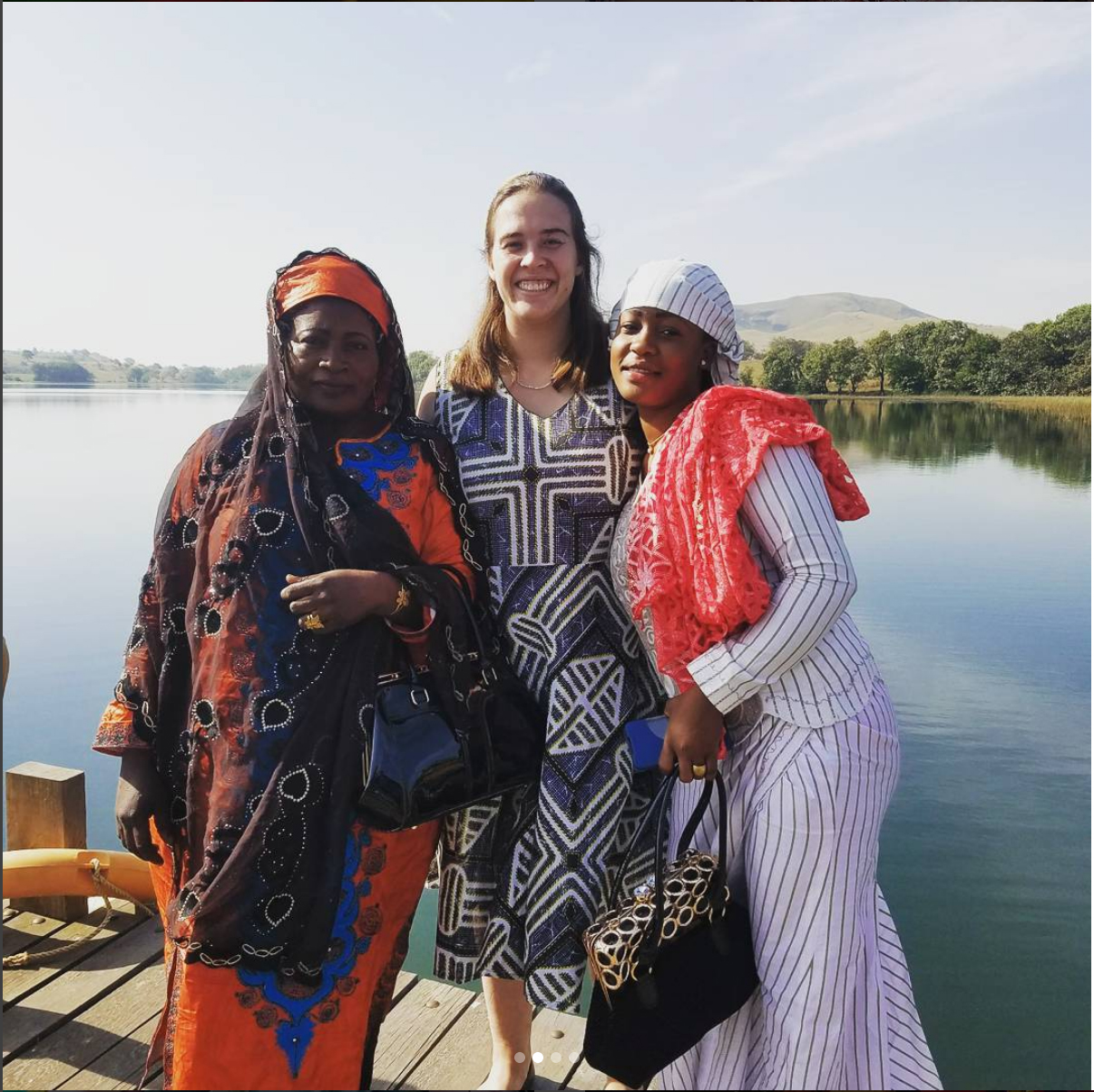
After earning bachelor’s degrees in dairy science and animal and poultry science in 2017, Rak joined the Agriculture Peace Corps. Today, she is an international volunteer, helping farmers in the villages of Grand North in Cameroon, Africa. Rak evaluates farming practices, hosts agricultural trainings and vaccination campaigns, and teaches in local schools.
“To me, Ut Prosim is an ideology,” Rak said. “I don’t necessarily need to be in another country or speaking a new language because to me, Ut Prosim is just being blessed with the opportunity to do meaningful work.”
For more than a century, alumni like Rak have moved into careers and professions that bolster the university’s tradition of service. Equipped with a strong educational background, a commitment to hard work, and a can-do, lunch-pail attitude, their work positively impacts communities, the country, and the world. They are Virginia Tech’s ambassadors, reaching out and bringing back to provide the inspiration and insight that advances the direction of the university and inspires its future students.
For Darryl Settles ’84, a Boston-area restaurateur, property developer, and civic leader, Tech offered the experiences that helped shape him into not only a successful entrepreneur, but a leader dedicated to improving the quality of life in his community.
“I take to heart that we should make positive differences in the world while we are here.”
Darryl Settles ‘84
“I have always been involved with organizations that do quality work to improve the lives of others,” Settles said. “I take to heart that we should make positive differences in the world while we are here.” That spirit drove his decision to transfer to Virginia Tech as a sophomore, and it would later influence his move from engineering to entrepreneurship.
Professionally, Settles, who majored in industrial and systems engineering, operates a real estate development firm and investment company, Catalyst Ventures Development, as well as two restaurants, Darryl’s Corner Bar and Kitchen and Slade’s Bar and Grill. The restaurants are known as places where good food, good music, and good friends come together. When Settles first landed in Bean Town, he missed such hangouts, so he chose to fill the niche himself.
But it’s his work in the Boston community that he lists atop his accomplishments. During the past three years, Settles’ efforts have focused on issues of inequality within minority communities. He co-founded the Black Economic Council of Massachusetts, which is helping to influence public policy at both the city and state levels to encourage an equal playing field for minority-owned businesses.
Joyal Mulheron of Dumfries, Virginia, found her role working with another marginalized population parents coping with the deaths of children in an unexpected place.
For the 1999 English and biochemestry graduate, visiting Virginia Tech always seemed like a good idea, but a game in Lane Stadium shortly after her daughter’s death in 2010 had particularly profound impact.
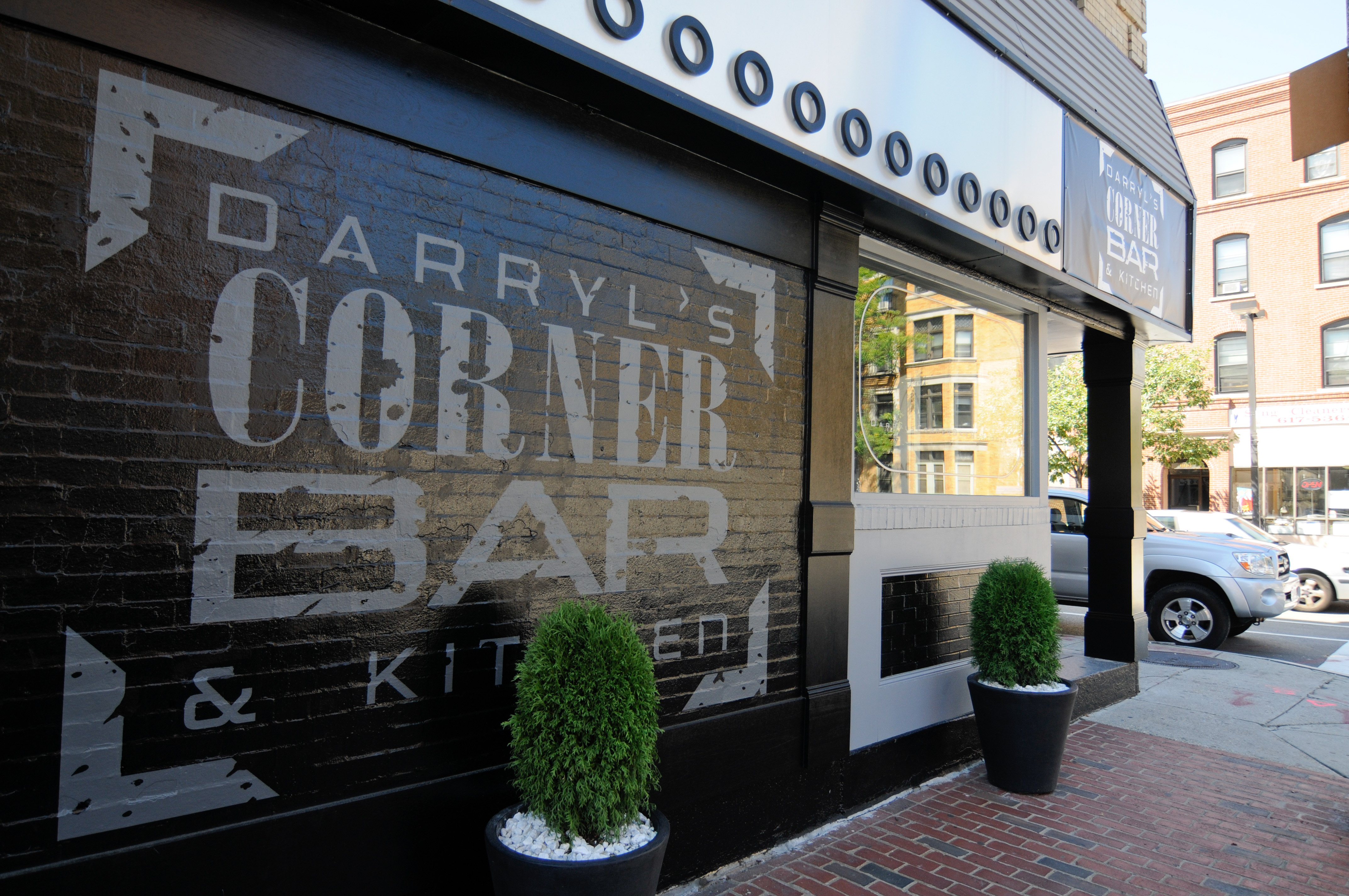
Helpful Hokies: (Above) Darryl’s Corner Bar and Kitchen in Boston is owned by Darryl Settles ’84. (Below) Joyal Mulheron ’99, pictured with her daughters, Addie Legresse and Charlotte Grace, channeled her personal grief into an opportunity to serve.
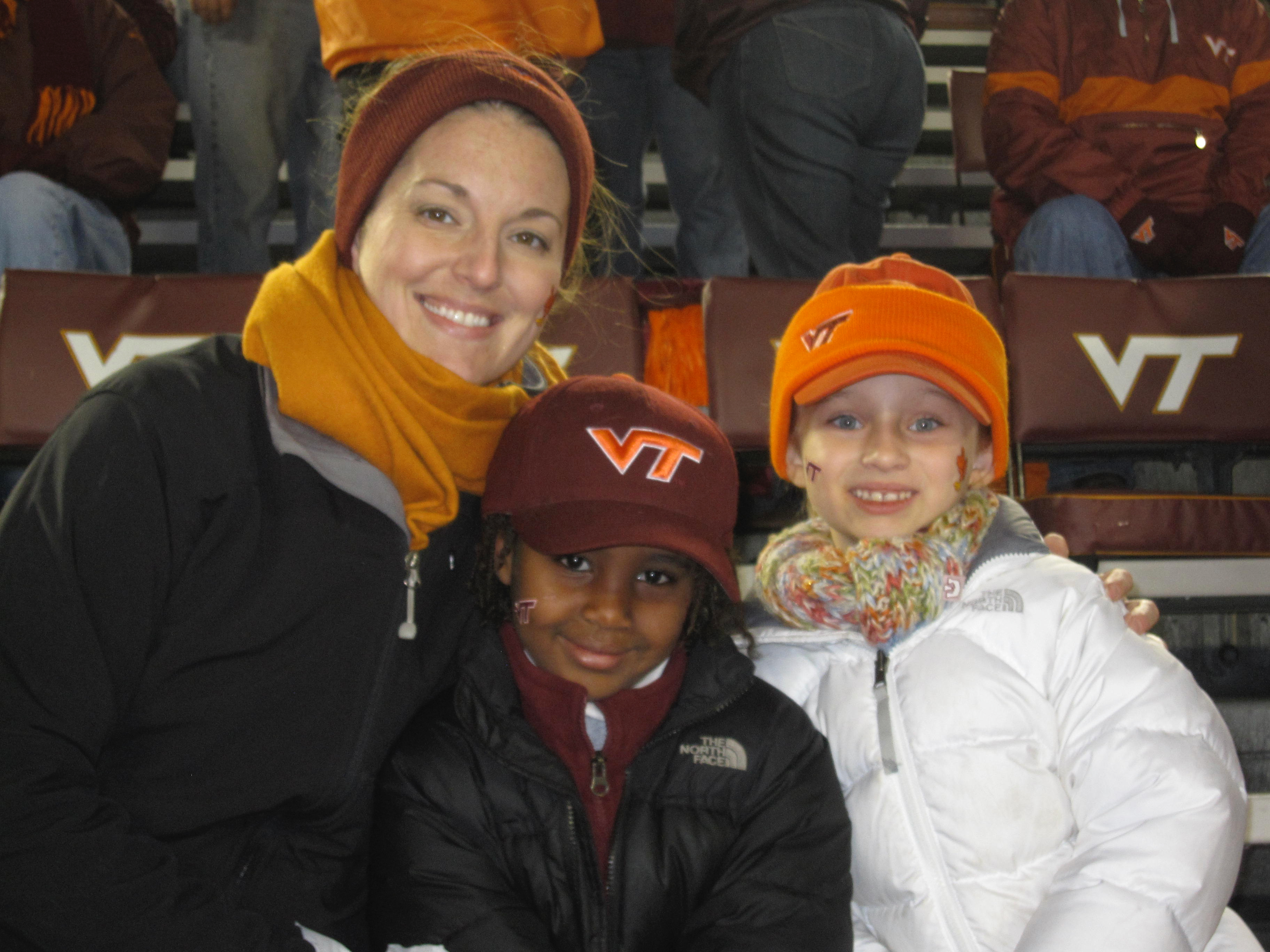
“I suppose you never know what someone else is going through, but feeling Hokie pride that night gave us a glimmer of hope that we could feel happiness again,” Mulheron said. Although Mulheron didn’t realize it right away, that moment would take her life in a new direction.
A few years later, in 2015, she left her job as chief strategy officer for the Partnership for a Healthier America, the private offshoot of former First Lady Michelle Obama’s “Let’s Move” campaign, to launch the nonprofit Evermore. The organization helps people grappling with the death of a child and advocates for policies, like paid leave, that recognize the grief in such situations.
As a student, Mulheron had learned about answering the call to serve, investing hundreds of hours with the Special Olympics and the Chi Delta Alpha sorority in Blacksburg, earning the university’s Volunteer of the Year award just prior to graduation. Today, she finds her call to fill the unmet needs of others amplified even more.
“From families whose children have been murdered, or who have died by accident, or suicide, or cancer, or war, I have had the opportunity to serve them in hopes of changing our nation’s policies for bereaved families of all walks of life,” Mulheron said.
Years after being a student and years before launching her nonprofit, she realizes the day in Lane Stadium was a small moment, but one that served as a microcosm for the university’s role in her entire life.
“I would not be where I am today without the experiences and life changes that began at Virginia Tech,” Mulheron said. “Once a Hokie, always a Hokie. There’s nothing more to say.”
Continuing to Build the future:
One Story After Another

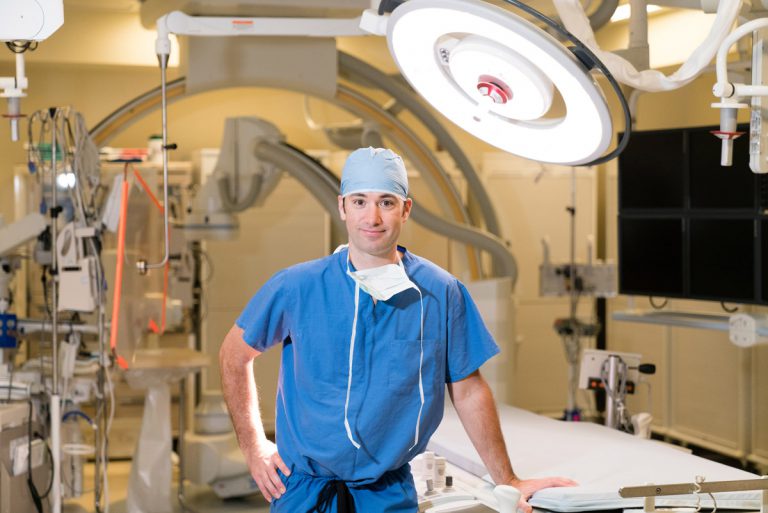
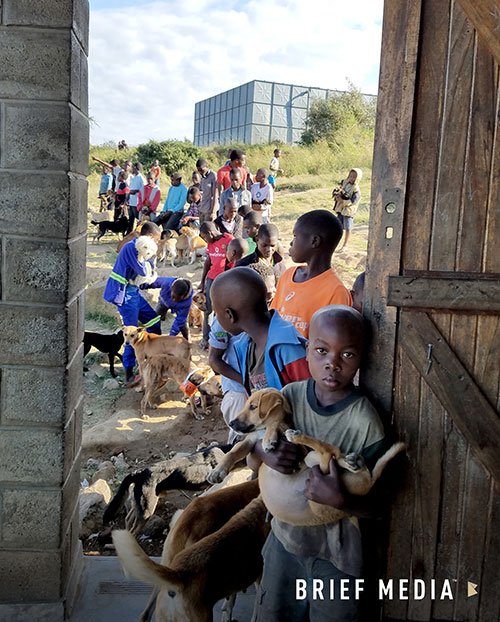
During the spring of 2016, Michael Webb (pictured top right), then a senior studying forestry, discovered several infestations of the invasive emerald ash borer on campus. Although 35 campus trees were beyond assistance, the remaining 30 trees were treated and closely monitored to ensure their long-term survival.
Just over a year ago, Joe Scalea ’02 (pictured middle right), a liver, kidney, and pancreas transplant surgeon, was tasked with expanding the University of Maryland Medical Center’s pancreas transplant program in Baltimore as its new director. Under his leadership, patient evaluations for potential pancreas transplants have grown seven-fold, and the pancreas transplant rate is up 116 percent.
Scalea traced his accomplishments with the hospital’s transplant program back to his Virginia Tech education, “All of this progress is a direct result of the skills I gained while a business information technology major at the Pamplin College of Business,” said Scalea.
Saving human lives isn’t always in a veterinarian’s job description, but Lauren Dodd, of Sugar Land, Texas, resident of clinical nutrition in the Department of Large Animal Clinical Sciences and master’s candidate in the Biomedical and Veterinary Sciences and Public Health Program, has been doing just that through her work with Mission Rabies in Blantyre, Malawi. Dodd participated in the second block of a month-long rabies vaccination drive (pictured bottom right). Combined, the two blocks successfully vaccinated 34,078 dogs, educated 137,635 children in 53 schools about rabies prevention, and facilitated lessons on rabies for 3,086 teachers. Rabies is responsible for killing an estimated 61,000 people annually, with 99 percent of all human cases caused by dog bites.
This is our moment
The vision for Virginia Tech connects research scientists to theater experts to inspiring alumni and eager students. It is an idea whose time is now, a strategy with opportunities for the entire Hokie Nation.
How can you help? Contact your college or go to alumni.vt.edu to learn more about being a mentor or speaking on campus. Talk with a prospective student. Visit givingto.vt.edu to make a donation.
“What a great moment to be at Virginia Tech. It’s going to be exciting, but it will take all of us working together,” said President Tim Sands.
Answer Sands’ challenge, and “pick up the lunch pail.”
What's Your Story?
Write to Virginia Tech Magazine to let us know how you are answering the challenge. Send us a message at vtmag@vt.edu.
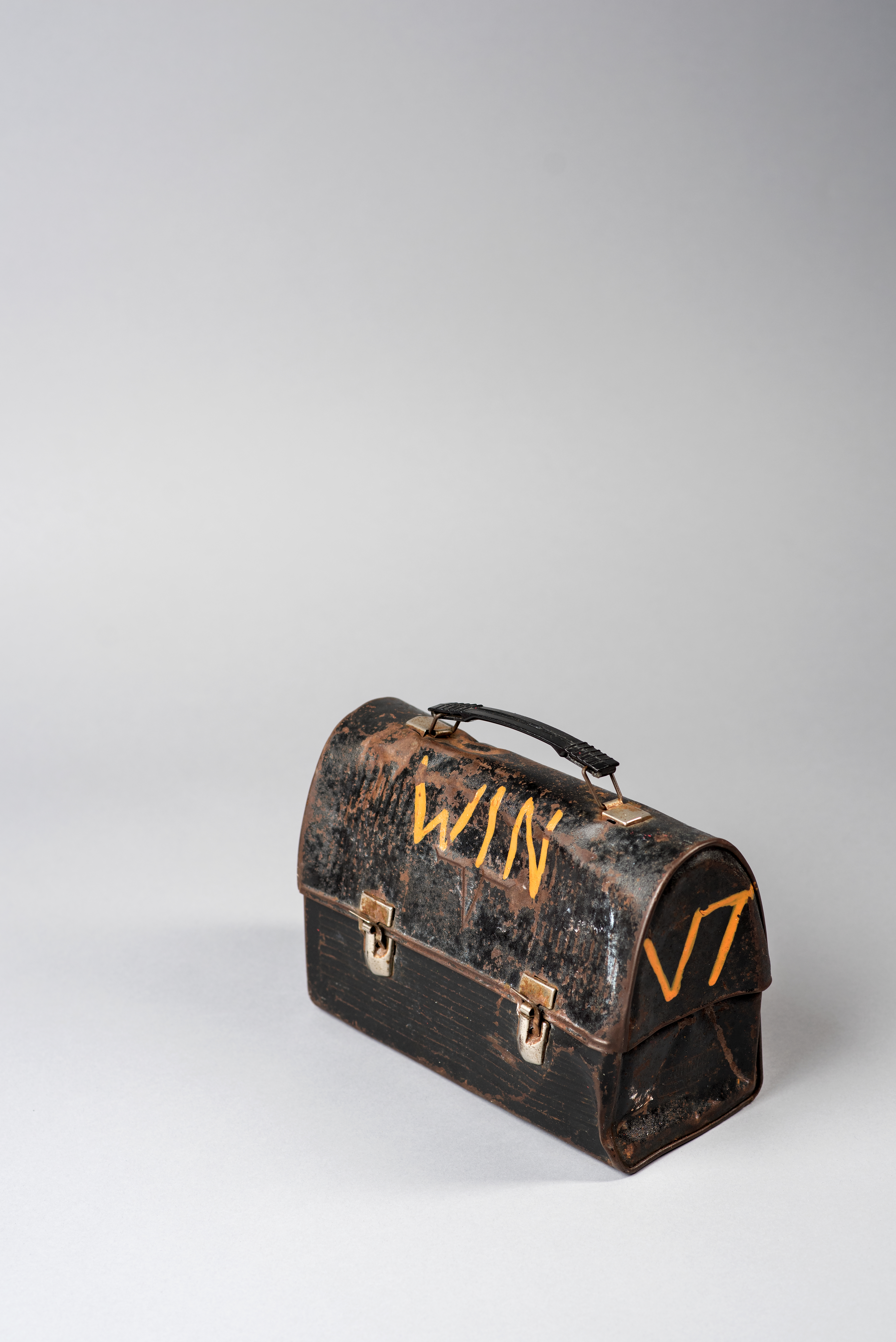
The famed Virginia Tech lunch pail has come to symbolize the blue-collar approach of the Hokies' football defense under assistant head coach and defensive coordinator Bud Foster.
In 1995, Foster served as co-defensive coordinator with Rod Sharpless, whose mother-in-law found the original lunch pail in Mercerville, New Jersey. The pail once belonged to a coal miner, and after the record-setting defensive season, the lunch pail became an iconic element of the Hokies' lore.
The pail travels wherever the Hokies go, and its care is entrusted to a defensive leader.
For senior linebacker Andrew Motuapuaka of Virginia Beach, Virginia, the pail serves as a visual reminder of what it means to be a Hokie. “I will use the lunch-pail mentality in every aspect of my life in the future,” he said.
“The lunch pail is Virginia Tech. It represents hard-working people,” Motuapuaka said. “It represents generation-changers, and it represents the people who will one day change the world.”
